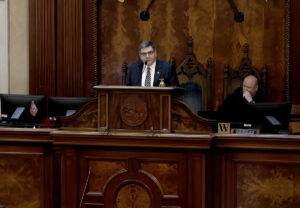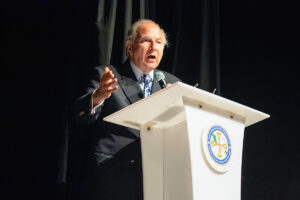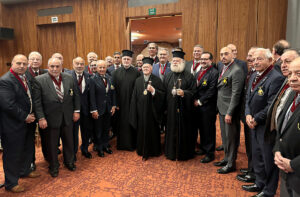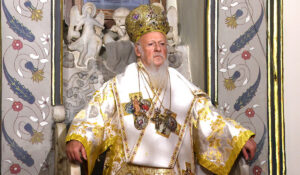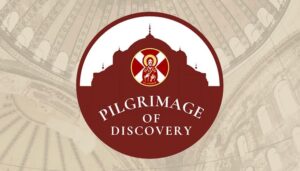Today’s Zaman newspaper recently reported on ‘Deep state did great injustice to non-Muslim minorities, says Celik’.
Today’s Zaman is one of two English-language dailies based in Turkey and reports on domestic and international coverage.
The published article can be read in its entirety below.
Deep state did great injustice to non-Muslim minorities, says Celik
By Ali Aslan Kilic
3/21/2010
Read this article on the website of Today’s Zaman.
“The deep state and the pro-single-party spirit of the Republican People’s Party [CHP] lies behind the injustices that were done to non-Muslims in Turkey, which runs entirely contrary to the foundations of our culture,” said Huseyin Celik, the Justice and Development Party’s (AK Party) deputy chairman.
Speaking to Sunday’s Zaman in an exclusive interview, Celik, who was formerly Turkey’s education minister, said the CHP and Turkey’s deep state have “otherized” most of the population, which he identified as being villagers, Alevis, Kurds, non-Muslims and the pious.
The single-party period of Turkey begins with the CHP being the only party after the founding of the republic on Oct. 29, 1923 and ends in 1946 with the establishment of the National Development Party (MKP).
“Serious injustices were done to all these groups during the single-party era in Turkey; however, the injustices done to the non-Muslims were more severe. The wealth tax was a disgrace. The closure of the Greek seminary was a great shame. The Sept. 6-7 incidents were an inhumane conspiracy that humiliated Turkey in the eyes of the world. The alienated villagers were unable to enter Ankara’s city center until 1946. The violation of the rights of the humiliated Alevis, Kurds and the pious have continued until today,” Celik explained.
The wealth tax was a tax levied on the wealthy citizens of Turkey in 1942, with the stated aim of raising funds for the country’s defense in the event of eventual entry into World War II. Those who suffered most severely from this tax were non-Muslims: Jews, Greeks, Armenians and Levantines, who controlled a large portion of the economy.
Established on Oct. 1, 1844, on Heybeli Island — or Halki in Greek — in the Marmara Sea, the Halki Seminary was the main school of theology for the Eastern Orthodox Church’s patriarchate in Istanbul until its closure by Turkish authorities in 1971.
The unfortunate events of Sept. 6-7, 1955 started after a newspaper headline said the home of the nation’s founder, Ataturk, in Greece had been bombed by Greek militants. Fired up by the media, mobs killed and harassed non-Muslims and non-Turkish minorities in a massive campaign.
Celik explained that the first group that saved itself from the “otherization” policy were the villagers. The votes of these people made it possible for Turkey to adopt a multi-party system in 1946 and played an important role in ensuring this.
Indicating that 80 percent of the public was living in villages back then, Celik said: “Since the politicians had to ask for the votes of the villagers, they were saved from being an ‘otherized’ group. It was forbidden for the villagers to enter Ulus and Kizilay [neighborhoods located in central Ankara] until 1946.”
He stressed that it was also crucial to end the “otherization” of other groups, showing democracy as the only way to achieve this. Complaining about the ongoing debates in Turkey about non-Muslims, Celik said these debates led to an unnecessary public sensitivity about non-Muslims in the country.
“We have been having ‘ecumenical’ debates for a long time. Is Bartholomew ecumenical or not? It’s none of our business. Why do Muslims debate the world leader of the Orthodox community, why do they want to be decision-makers regarding this issue? Let the Orthodox community decide on this. If they see Istanbul Fener Patriarch Bartholomew as ecumenical, do we have any right to debate this as non-Orthodox people? Let the Orthodox people decide of their own free will,” he said.
Celik described the closure of the Greek seminary as another great injustice done to non-Muslims and said it was very embarrassing that Turkey had failed to overcome the resistance of the pro-status quo circles to reopen the school.
When asked what kind of obstacles the government has faced regarding its efforts to reopen the seminary, Celik said: “We cannot overcome the status quo. We cannot act alone. Why was a reform package which was approved by 411 deputies cancelled by the Constitutional Court? Can Parliament and government decide on a reform, can they put it into force in this country?” asked Celik.
He was referring to a reform initiated by the government in 2008 that would remove the headscarf ban at universities but which was cancelled by the Constitutional Court, despite getting overwhelming support from Parliament. The reform was challenged by the CHP at the Constitutional Court.
Recalling another incident that took place in 2004, Celik said former secretary-general of the National Security Council (MGK) Tuncer Kilic visited him, as education minister, and asked him to issue a regulation for the closure of all private schools. He said since the closure of private schools opened by followers of Turkish religious scholar Fethullah Gulen could not be closed down alone, closing down all private schools would ensure their closure as well.
“I told him such a thing was impossible to do and that doing something like this would be no different to bringing in communism. I tell you this because other schools were also closed down along with the Greek seminary. It was totally a wrong decision to close down the seminary, and it should be reopened,” Celik said in further remarks.
Minority status may be changed
The AK Party deputy chairman, who said all citizens of the Turkish Republic were first-class citizens no matter what their religion or language, explained that the minority status granted to the non-Muslim communities in Turkey by the Lausanne Treaty may be altered.
“In my view, none of our 72 million citizens should be treated as a minority,” Celik said. Indicating that believers of the three monotheistic religions along with many other religious communities lived in peace during the Ottoman Empire, Celik said the state approached all religions and beliefs with tolerance back then. “The slogan that reflected this in the Ottoman Empire was ‘Diversity in unity,’ a slogan which is now promoted by the Council of Europe. The two cultures met at the same point centuries later.”
Celik, who launched the restoration of the Armenian Akdamar Church in Van, said there was no problem in holding religious services in the church and hanging a crucifix on its wall.”
The Akdamar Church on Akdamar Island on Lake Van was opened in 2007 as a museum after it was restored by the Turkish government between May 2005 and October 2006. The restoration cost $1.7 million (TL 2.6 million).
Celik said it was hypocritical of some to demand the survival of Ottoman-era works of art in other countries while opposing the restoration of Akdamar Church.
‘Genocide’ allegations used as a political trump card
Remarking on the approval of resolutions that recognize killings of Armenians in 1915 as “genocide,” by the US House Foreign Affairs Committee and the Swedish parliament, Huseyin Celik, the Justice and Development Party’s (AK Party) deputy chairman, said the “genocide” issue was being used as a political trump card against Turkey. “No parliament of one country can make a ruling about the history of another country. It is the historians and scientists that will decide on history. Politicians cannot make decisions regarding this. Even if they do, their decisions will be meaningless,” he said.

